Related Research Articles
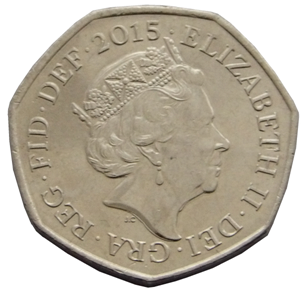
The British decimal fifty pence coin is a denomination of sterling coinage worth 1⁄2 of one pound. Its obverse features the profile of the current Monarch since the coin's introduction in 1969. As of October 2022, five different royal portraits have been used.
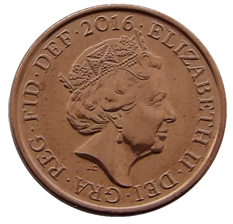
The British decimal one penny (1p) coin is a unit of currency and denomination of sterling coinage worth 1⁄100 of one pound. Its obverse featured the profile of Queen Elizabeth II since the coin's introduction on 15 February 1971, the day British currency was decimalised until her death on 8 September 2022. A new portrait featuring King Charles III was introduced on 30 September 2022, designed by Martin Jennings. Four different portraits of the Queen were used on the obverse; the last design by Jody Clark was introduced in 2015. The second and current reverse, designed by Matthew Dent, features a segment of the Royal Shield and was introduced in 2008. The penny is the lowest value coin ever to circulate in the United Kingdom.

Dominic Charles Roberts Grieve is a British barrister and former politician who served as Shadow Home Secretary from 2008 to 2009 and Attorney General for England and Wales from 2010 to 2014. He served as the Member of Parliament (MP) for Beaconsfield from 1997 to 2019 and was the Chair of the Intelligence and Security Committee from 2015 to 2019.
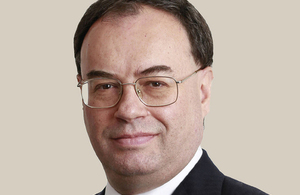
Andrew John Bailey is a British central banker and Governor of the Bank of England since 16 March 2020.
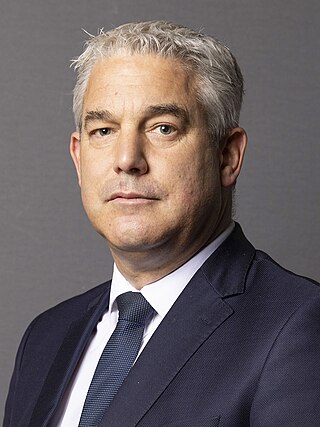
Stephen Paul Barclay is a British politician who has been the Secretary of State for Environment, Food and Rural Affairs since November 2023, having previously served in various cabinet positions under prime ministers Theresa May, Boris Johnson and Rishi Sunak between 2018 and 2023. A member of the Conservative Party, he has been Member of Parliament (MP) for North East Cambridgeshire since 2010.

Sir Sajid Javid is a British politician who served as Secretary of State for Health and Social Care from June 2021 to July 2022, having previously served as Home Secretary from 2018 to 2019 and Chancellor of the Exchequer from 2019 to 2020. A member of the Conservative Party, he was Member of Parliament for Bromsgrove between 2010 and 2024.
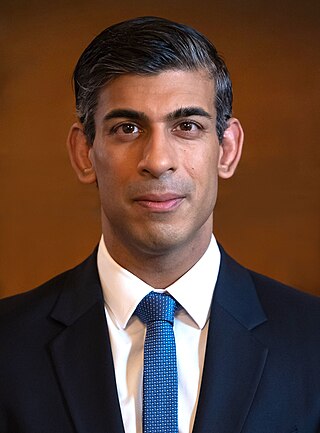
Rishi Sunak is a British politician who has served as Prime Minister of the United Kingdom and Leader of the Conservative Party since 2022. The first British Asian prime minister, he previously held two cabinet positions under Boris Johnson, latterly as Chancellor of the Exchequer from 2020 to 2022. Sunak served as Member of Parliament (MP) for Richmond (Yorks) from 2015 to 2024.

Alberto Castrenze Costa is a British Conservative Party politician who has been the Member of Parliament (MP) for South Leicestershire since 2015.
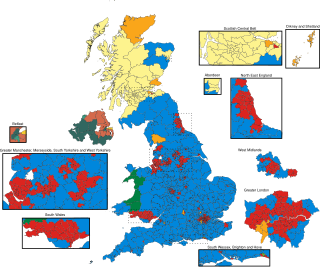
The 2019 United Kingdom general election was held on Thursday 12 December 2019 with 47,567,752 registered voters entitled to vote to elect members of the House of Commons. The governing Conservative Party won a landslide victory with a majority of 80 seats, a net gain of 48, on 43.6% of the popular vote, the highest percentage for any party since the 1979 general election, though with a narrower popular vote margin than that achieved by Labour over the Conservatives in 1997. This was the second national election to be held in 2019 in the United Kingdom following the 2019 European Parliament elections.
Dominic Mckenzie Cummings is a British political strategist who served as Chief Adviser to British Prime Minister Boris Johnson from 24 July 2019 until he resigned on 13 November 2020.
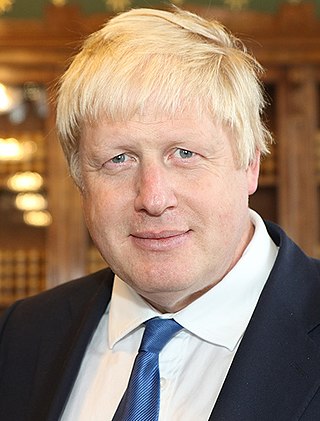
The 2019 Conservative Party leadership election was triggered when Theresa May announced on 24 May 2019 that she would resign as leader of the Conservative Party on 7 June and as Prime Minister of the United Kingdom once a successor had been elected. Nominations opened on 10 June; 10 candidates were nominated. The first ballot of members of Parliament (MPs) took place on 13 June, with exhaustive ballots of MPs also taking place on 18, 19 and 20 June, reducing the candidates to two. The general membership of the party elected the leader by postal ballot; the result was announced on 23 July, with Boris Johnson being elected with almost twice as many votes as his opponent Jeremy Hunt.

The 2018 United Kingdom budget was delivered by Philip Hammond, the Chancellor of the Exchequer, to the House of Commons on Monday, 29 October 2018. It was Hammond's third as Chancellor of the Exchequer since being appointed to the role in July 2016, and his last before being replaced by Sajid Javid by means of Boris Johnson's cabinet reshuffle upon becoming prime minister in July 2019. Following the budget in March 2017 the government moved the annual budget to the Autumn, with the following budget held on 22 November of the same year. On 26 September 2018, Hammond announced that the 2018 budget would be held earlier, in October, so as to avoid clashing with the final stage of Brexit negotiations. On 28 October he suggested that a second budget would be needed in the event of a failure to negotiate a Brexit deal, since the scenario would require a "different response", with a need for "fiscal buffers" to provide support for the economy.

Brexit negotiations in 2019 started in August, after having originally concluded in November 2018 with the release of the withdrawal agreement. Negotiations took place between the United Kingdom and the European Union during 2017 and 2018 for the withdrawal of the United Kingdom from the European Union following the referendum held on 23 June 2016.
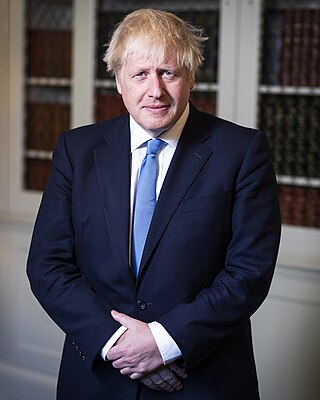
Boris Johnson's tenure as prime minister of the United Kingdom began on 24 July 2019 when he accepted an invitation of Queen Elizabeth II to form a government, succeeding Theresa May, and ended on 6 September 2022 upon his resignation. As prime minister, Johnson served simultaneously as First Lord of the Treasury and Minister for the Civil Service. He also served as Minister for the Union, a position created by him to be held by the prime minister that has been retained under his two immediate successors Liz Truss and Rishi Sunak. Johnson's premiership was dominated by Brexit, the COVID-19 pandemic, the Russian invasion of Ukraine, and the cost of living crisis. His tenure was also characterised by several political controversies and scandals, being viewed as the most scandalous premiership of modern times by historians and biographers.

The second Johnson ministry began on 16 December 2019, three days after Boris Johnson's audience with Queen Elizabeth II where she invited him to form a government following the 2019 general election. The Conservative Party was returned to power with a majority of 80 seats in the House of Commons. Initially the ministers were largely identical to those at the end of the first Johnson ministry, but changed significantly in cabinet reshuffles in February 2020 and September 2021.

The 2020 United Kingdom budget, officially known as Budget 2020: Delivering on Our Promises to the British People, was a budget delivered by Rishi Sunak, Chancellor of the Exchequer, to the House of Commons on Wednesday 11 March 2020. It was Sunak's first budget, the first since the withdrawal of the United Kingdom from the European Union, the first since Boris Johnson becoming Prime Minister and the first to be held in the spring since March 2017.

Get Brexit Done was a political slogan frequently used by the British Conservative Party and former Prime Minister Boris Johnson in the run up to the 2019 general election. The slogan reflected the party's pledge to, if re-elected, facilitate the United Kingdom's withdrawal from the European Union by the end of January the following year.

Boris Johnson carried out the first significant reshuffle of his majority government on 13 February 2020. Following the December 2019 general election, there was considerable speculation that Johnson was planning a major reshuffle of the Cabinet, to take place after the United Kingdom's official withdrawal from the European Union on 31 January 2020. There were reports that up to a third of the Cabinet would be dismissed, Whitehall departments abolished and civil servants replaced by policy experts; however, the reshuffle was smaller than expected and no departments were abolished. The anticipated reshuffle was nicknamed "The St Valentine's Day Massacre" in the press, due to its proximity to St Valentine's Day, the name being a reference to the 1929 gangland shooting in Chicago.
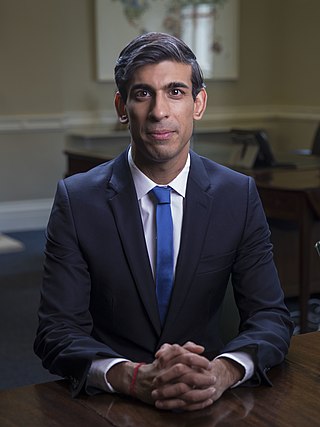
Rishi Sunak served as Chancellor of the Exchequer of the United Kingdom from his appointment on 13 February 2020 to his resignation on 5 July 2022. His tenure was dominated by the COVID-19 pandemic in the United Kingdom, with Sunak becoming a prominent figure in the government's response to the pandemic, giving economic support to struggling businesses through various schemes. He was also involved in the government's response to the cost of living crisis, UK energy supply crisis, and global energy crisis.
The July–September 2022 Conservative Party leadership election was triggered by Boris Johnson's announcement on 7 July 2022 that he would resign as Leader of the Conservative Party and Prime Minister of the United Kingdom, following a series of political controversies.
References
- ↑ Inman, Phillip (25 October 2019). "Production of Brexit 50p coin paused amid exit uncertainty". The Guardian. ISSN 0261-3077 . Retrieved 28 October 2019.
- ↑ "Sajid Javid's plan to flood tills with Brexit 50p coins". The Guardian. Press Association. 11 August 2019. ISSN 0261-3077 . Retrieved 28 October 2019.
- ↑ Hope, Christopher (7 October 2019). "More than 10 million Brexit 50p coins to be minted - three times more than previously thought". The Telegraph. ISSN 0307-1235 . Retrieved 28 October 2019.
- ↑ "Brexit coins 'paused' amid uncertainty". 25 October 2019. Retrieved 28 October 2019.
- 1 2 "Brexit 50p coins to be 'recycled' after PM accepts extension". BBC News. 28 October 2019. Retrieved 29 October 2019.
- 1 2 Inman, Phillip (29 October 2019). "Brexit meltdown: 50p coins with 31 October date to be recycled". The Guardian . Retrieved 29 October 2019.
- 1 2 Waterson, Jim (20 December 2019). "All change: UK tries again with new 50p to mark Brexit date". The Guardian . Retrieved 26 January 2020.
- ↑ Helm, Toby (26 January 2020). "Brexit: Heseltine says celebrations rub remainers' noses in it". The Guardian . Retrieved 26 January 2020.
- ↑ "Philip Pullman calls for boycott of Brexit 50p coin over 'missing' Oxford comma". The Guardian. 27 January 2020.